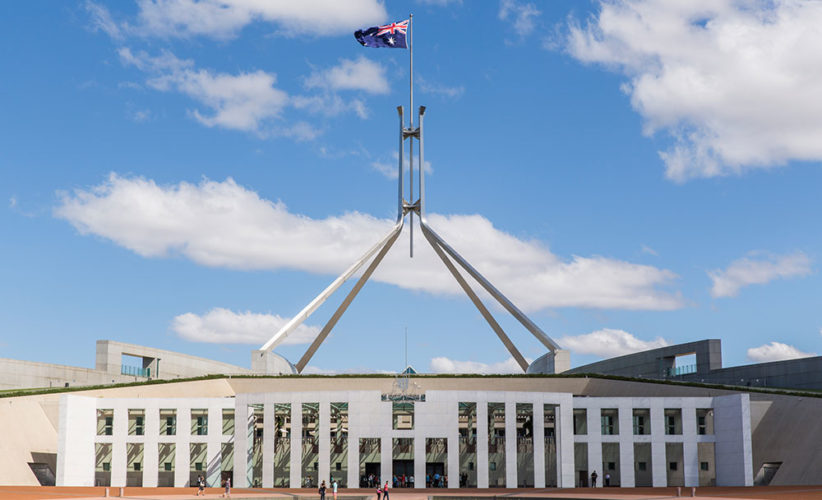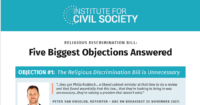A PDF version of this paper is available here.
On 13 December 2018 the Prime Minister released the government’s response to the Ruddock review – see here. His media release said[1]:
“Our response to the Religious Freedom Review includes:
- establishing religion as a protected attribute in a new Religious Discrimination Act, rendering discrimination on this basis unlawful;
- establishing a new statutory position of Freedom of Religion Commissioner in the Australian Human Rights Commission;
- developing a Human Rights Legislation Amendment Bill for introduction into Parliament as soon as practicable, implementing a range of amendments recommended by the Ruddock Review;
- supporting the Australian Human Rights Commission to increase community awareness of the importance of freedom of religion.
We look forward to consulting on the legislative package, which we intend to introduce in 2019.”
Following the re-election of the Morrison Coalition government, we are asking the government to:
- quickly implement their December 2018 commitments to religious freedom in their long-delayed response[2] to the Ruddock Expert Panel Report of May 2018
- bring forward the timing of delivery of some of those commitments instead of pushing many into 2020 and beyond as proposed
- go further than those existing commitments on some issues.
We are also asking the ALP to reconsider the non-committal approach it took to the election on the Ruddock recommendations and wider religious freedom issues.
It is widely recognised that the government was re-elected in part due to the support of voters concerned about the protection of freedom of religion and belief. Demographers and ALP frontbenchers have noted the swing against the ALP in Western Sydney and other places due to the sense alienation of some religious voters from ALP policies such as on religious schools. During the campaign letters signed by a wide range of religious leaders were sent to Scott Morrison and Bill Shorten. The Prime Minister’s reply to Christian Schools Australia on 14 May 2019 contains clear promises[3] about protecting religious freedom, including legislating to protect religious people from discrimination, protecting charities and protecting the right of religious bodies and schools to conduct themselves in a way consistent with their ethos. The election result provides the opportunity for the Government to make good on those promises.
The Elements of a Religious Freedom Agenda
This note briefly outlines some of the main elements of a religious freedom agenda.
- A Religious Discrimination Bill
A Religious Discrimination Bill is scheduled to be the first element on which the government acts, but it is not the only or most important element. The Attorney-General has said that he will present a standard model anti-discrimination Bill in the first week of July 2019, but that timing is likely to be delayed somewhat. It would operate like existing anti-discrimination laws which protect people from discriminatory acts and practices on the grounds of race, sex, disability, age, political opinion and sexual orientation.
Those interested in religious freedom will want a robust Religious Discrimination Bill that is better than the standard model. For example the Bill should:
- Protect both individuals and religion-based groups from discrimination against them on the grounds of their religious belief or activity. Recognising that international law uniquely protects freedom of religion and belief as a right to be exercised both individually and in community with others (See International Covenant on Civil and Political Rights (ICCPR) Articles 18 and 27), a Religious Discrimination Bill should protect religion-based groups as well as religious individuals from discrimination against them based on their religious belief or activity. (The Bill would also protect people from discrimination based on them holding no religious belief because the ICCPR covers a right to hold no religious belief.)
Examples would include making it unlawful to discriminate against an employee or contractor, a professional, a student or teacher or religious individual or a group seeking to hire a venue or acquire a service because of that person’s or group’s religious beliefs or activities (or lack of them). There are laws protecting religious individuals from discrimination in most States and Territories but it is not clear that they protect religious groups, and there is no protection for individuals or groups in federal anti-discrimination law or in NSW or South Australian anti-discrimination law (so Israel Folau in NSW could not claim under anti-discrimination law and has to rely on a provision about termination in the Fair Work Act).
- Stop protecting other rights as “exemptions”. This Act will need to provide a positive right for a religious-belief based organisation (based on one religion or atheism) to choose to select employees and volunteers who share that religion (or atheism) and not others e.g. a Muslim religious-belief based organisation would not breach this law if it had a policy of employing Muslims and not atheists, Buddhists or Christians. The standard model would use “exemptions” to achieve this. But other rights are not to be treated as narrow “exemptions” to the right not to be discriminated against. The right of all Australians to freedom of religion, conscience and belief is not an “exemption” to other rights but a fundamental right equal to other rights. So a robust Religious Discrimination Bill would use something like a general limitation clause to balance competing rights rather than “religious exemptions”. Bishop Michael Stead and Professor Patrick Parkinson released a proposal for such a Bill on 11 June 2019 with such a positive right. ICS supports the broad thrust of that proposal.
A Religious Discrimination Act is a defensive shield against acts and practices by other individuals, companies and governments which are discriminatory on the grounds of religion (or its absence). It would not prevent laws or government polices of general application from applying to religious people or organisations in a non-discriminatory manner e.g. laws against violence or terrorism or domestic violence or assault and normal civil liability rules. Nor would it authorise separate systems of religious laws.
- A Religious Freedom Act
This type of Act would go beyond prohibiting discrimination against religious individuals and groups. Suitably drafted, it would provide a statutory limit on government action by Ministers, public servants and councils which unjustifiably burden religion (whether by Federal, State and or local government). The government has not yet committed to introduce a Religious Freedom Act.
The need for such an Act is demonstrated by the weak ‘purposive’ interpretation the High Court has given to the free exercise of religion clause in section 116 of the Australian Constitution, which as a result has very limited effect. The limitations of section 116 and the generally very poor state of legal religious freedom protection in Australian law was recently acknowledged by the Commonwealth Parliament Joint Standing Committee on Foreign Affairs Defence and Trade in its First Interim Report on its Inquiry into the status of the human right to freedom of religion or belief.
A Religious Freedom Act would be based on the external affairs power to meet Australia’s international obligation to implement ICCPR Article 18. The Act could provide that, where any governmental action places a limitation upon religious belief or activity, an affected person would have the right to bring a court action where the government would need to justify to the court that the burden on religious freedom was:
- necessary to achieve one of the five objectives of permissible limitation under the ICCPR, namely ‘necessary to protect public safety, order, health or morals or the fundamental rights and freedoms of others’ ; and
- used no more restrictive means than were required to achieve the objective (this is a corollary of the burden being “necessary” and is made explicit in the Siracusa Principles).
For example, some State Education Departments implemented (at least for a period) rules that no sacred texts or quotes from these texts were to be brought by students into State schools or given by one student to another (even in Christmas cards) arguing that was necessary to provide a “safe environment” for all students. Under a federal Religious Freedom Act which bound the Commonwealth and the States and Territories, the Department would need to justify to a court that it was necessary to have such rules to achieve the objective of safety of students and would also need to justify why no lesser interference with religious freedom was not possible.
Another example would be a policy of a local council or government agency to refuse to hire its meeting rooms for or to provide permits for public meetings which it considered would promote offensive views. While that policy is neutral on its face towards religion, if it was administered in such a way that people with traditional religious views (e.g. that sexual relations should be reserved for man-woman marriage) were treated as promoting offensive views whereas people with competing non-religious views (e.g. that all and any consenting sexual relations between any persons over 16 years were healthy) were not promoting offensive views, there would be a governmental burden on the expression of those traditional religious views. Under a Religious Freedom Act, the council or government agency would have to justify to a court its administration of the policy as it related to the expression of religious views.
A Religious Freedom Act is also a defensive shield against acts and practices by governments which unduly burden religious freedom unless they can be justified to a court in terms of Article 18 of the ICCPR as necessary to protect public safety, order, health or morals or the fundamental rights and freedoms of others. Government action which is necessary to protect public and personal safety such as action against terrorism or domestic violence or assaults on people purportedly done in the name of religion will be clearly justifiable and not affected by a Religious Freedom Act. Likewise government action which is necessary to protect the health of people and the rights of women or children or minorities will be justifiable under a Religious Freedom Act. Such an Act will not authorise separate systems of religious laws or stop justifiable government action which overrides private action based on systems of religious laws.
A Religious Freedom Act effectively forces governments at all levels to think twice before introducing measures which burden religious freedom and, if challenged, to justify the necessity of that burden against 5 permitted objectives and the extent of that interference to a court.
- 3. Charities protection re views on man-woman marriage
The objects of a charity must be in conformity with public policy and must be for the public benefit.
In England and Wales 19 Catholic adoption charities lost their charitable status and tax concessions because they preferred to place adoptive and foster children with opposite sex married couple than to same sex couples, based on their religious beliefs about God’s model for optimal family structures. The Charities Commission considered that those bodies’ adoption policies were no longer in conformity with public policy once it became unlawful to discriminate on the grounds of sexual orientation. The relevant law had no “exemptions” or accommodation provisions for religious adoption and fostering bodies. The Charities Commission held that the Catholic bodies’ preference meant they no longer had a charitable purpose and were not entitled to charitable status. As a result the bodies were all closed or sold to secular operators.
There were many secular agencies which adopted and fostered children to same sex couples, so it is difficult to understand why the religious views of the Catholic charities could not be accommodated in a pluralist democracy along with secular agencies which together served the range of surrendering mothers, children and adoptive and foster parents. In contrast, the Scottish Charities Commission let Catholic charities continue their policies based on their religious freedom.
In the USA the concern about conformity to public policy has led the head of the Internal Revenue Service to clarify that he would not administer the law to disentitle religious adoption charities from tax exemption on the basis that their traditional view of marriage was contrary to public policy. But that is an administrative policy, not the law. On a separate ground, last year the New Zealand High Court held in relation to a Christian lobby group (Family First) that ‘it cannot be shown that Family First’s promotion of the traditional family unit, though no doubt supported by a section of the community, if achieved would be a public benefit’.[4] As a result it lost its charitable status.
The government has committed to amend section 11 of the Charities Act, pertaining to the requirement that a charity must be in conformity with public policy. It has not, however, committed to amend section 6 of that Act, which requires that charities be for the public benefit. As recommended by the Australian Charities and Not-for-profits Commission during the Parliamentary debate on the legalisation of same-sex marriage,[5] both provisions require amendment to clarify that holding a traditional view that marriage is only between a man and a woman and engaging in, or promoting, activities that support only man-woman marriage will not, of itself, disqualify a body from being charity under the Charities Act and so lose its tax status. These amendments are required to ensure the type of charity deregistration described above does not happen to Australian charities.
- Rights of parents to have input into and withdraw their children from classes which contradict the religious and moral framework of the family
The federal government has committed to develop Model Guidelines in relation to when and how a parent or guardian can request the removal of a child from any class that contains instruction on religious or moral matters that the parent or guardian may reasonably consider contrary to the religious doctrines, tenets or beliefs of that family.
The federal Minister for Education will encourage State and Territory Education Ministers to review their existing policies in accordance with the proposed model Guidelines.
Arguably this government response is inadequate because it contains no guarantee that the Model Guidelines will require that a parent’s or guardian’s request will be honoured. Nor is there any obligation on a State or Territory to implement the Commonwealth Model Guidelines. (Victoria has never complied with federal guidelines for content in the Safe Schools program.) By contrast New Zealand gives parents a statutory rights in its Education Act to withdraw children from the teaching of material that the parent or guardian may reasonably consider contrary to the religious doctrines, tenets or beliefs of that family. The Federal Government has constitutional power in this area to implement the rights of parents and guardians it committed to under Article 18(4) of the ICCPR and other international agreements.
Those in favour of religious freedom protections will want a stronger commitment from the government for legislated rights for parents rather than guidelines which some States and Territories and schools may just ignore.
- Changing or overriding low bar “insult or offend” prohibition laws
Some States and Territories (like Tasmania) have low bar “insult or offend” laws which prohibit conduct which would insult or offend members of a group because of their protected attributes e.g. relationship status, religious belief, gender identity, sexual orientation.
In Tasmania a Catholic Bishop and 2 other Christian preachers have been taken to the State Anti-Discrimination Commission because they presented what they described as standard Christian teaching on keeping sex within man-woman marriage. That teaching was complained of as being offensive to those who did not agree with or live by such teaching.
The government has referred to the ALRC the question of how to override such State and Territory to remove any legal impediments to the expression of a view that marriage should only be between a man and a woman,
That is a welcome development, but proponents of religious freedom will ask why it should be limited just to views that marriage is for a man and a woman (as opposed to the reasonable expression of other genuine religious teachings) and why any such override needs to wait for an ALRC report.
Proponents of religious freedom can support laws which prohibit real vilification and incitement of violence against people but strenuously object to laws which prohibit or limit the reasonable expression of a religious teaching just because its content insults or offends someone who disagrees with it.
With any religious discrimination or religious freedom legislation, careful consideration needs to be given to not limit the freedom of one religion to explicitly or implicitly criticise other religious views and to avoid reintroducing a blasphemy law in the form of a religious vilification law.
- Protecting the ability of religious schools and organisations to employ staff, teach and manage their affairs (including staff and student conduct policies) to maintain a community and ethos which reflects the values of the religion
In late 2018 the Greens and the ALP proposed controversial amendments, which were partly supported by the government, to remove the “religious exemptions” to the Sex Discrimination Act which allowed religious schools and colleges and training institutions and religious bodies like churches, mosques, synagogues and temples to have hiring and conduct policies and to teach in a way which maintained the religious ethos of the college or school. The Ruddock Report only looked at exemptions for schools and recommended that those exemptions be retained subject to schools being transparent about them with prospective parents and students.
However, the government did not accept that recommendation in terms and has asked the ALRC to report by April 2020 on how to limit or remove altogether (if practicable) religious exemptions to prohibitions on discrimination, while also guaranteeing the right of religious institutions to conduct their affairs in a way consistent with their religious ethos. Note that this reference goes beyond religious schools and colleges to cover all religious bodies.
Proponents of religious freedom want some or all these issues brought forward for legislative action this year rather than waiting until the middle of 2020. For example, as outlined above, rather than protecting religious institutional autonomy by way of exemptions, the Religious Discrimination Bill could introduce a positive right for religious institutions to select and prefer staff who conform to the beliefs and ethos of the religion, rather than wait for the ALRC recommendation on this particular matter in 2020.
- Amend the objects clauses in existing Commonwealth, State and Territory anti-discrimination legislation to reflect the equal status in international law of all human rights, including freedom of religion and reference the Siracusa Principles.
Because of the existing structure of anti-discrimination Acts that religious freedom (and other rights) are drafted as “exceptions” to another person’s right not to be discriminated against (e.g. on the grounds of relationship status), some courts and commentators have treated the “exception” right (e.g. religious freedom) as having lesser weight than the non-discrimination right. These proposed amendments and others would make it clear that Parliament intended that religious freedom has the same status and weight as other human rights. The Siracusa Principles on balancing religious freedom rights with other rights would also be incorporated.
The above is not an exhaustive list of issues in the Ruddock Report, the government response or religious freedom issues. Other proponents of religious freedom may have additional issues or variants on the above.
Appendix: Some Relevant International Declarations and Conventions on Religious Freedom
Relevant provisions of the applicable international declarations and conventions include the following.
Universal Declaration of Human Rights 1948 (UDHR)
Article 18
Everyone has the right to freedom of thought, conscience and religion; this right includes freedom to change his religion or belief, and freedom, either alone or in community with others and in public or private, to manifest his religion or belief in teaching, practice, worship and observance.
International Covenant on Civil and Political Rights (ICCPR)
Article 4
No derogation from articles 6, 7, 8 (paragraphs 1 and 2), 11, 15, 16 and 18 may be made under this provision.
Article 18
- Everyone shall have the right to freedom of thought, conscience and religion. This right shall include freedom to have or to adopt a religion or belief of his choice, and freedom, either individually or in community with others and in public or private to manifest his religion or belief in worship, observance, practice and teaching.
- No one shall be subject to coercion, which would impair his freedom to have or to adopt a religion or belief of his choice.
- Freedom to manifest one’s religion or beliefs may be subject only to such limitations as are prescribed by law and are necessary to protect public safety, order, health, or morals or the fundamental rights and freedoms of others.
- The States Parties to the present Covenant undertake to have respect for the liberty of parents and, when applicable, legal guardians to ensure the religious and moral education of their children in conformity with their own convictions.
Article 27
In those States in which ethnic, religious or linguistic minorities exist, persons belonging to such minorities shall not be denied the right in community with the other members of their group, to enjoy their own culture, to profess and practise their own religion, or to use their own language.
The ICCPR was ratified by Australia on 13 August 1980. Australia acceded to the First Optional Protocol to the ICCPR with effect from 25 December 1991.
Declaration on the Elimination of all Forms of Intolerance and Discrimination based on Religion or Belief (Religion Declaration)
Articles 2 & 3
These provisions prohibit any act or practice of intolerance or discrimination on the grounds of religion or belief by any person in any capacity whatsoever.
Articles 4 & 7
These place obligations on States to take positive measures to counter intolerance and discrimination on the ground of religion and belief.
Article 5
Freedom to impart religion or belief to one’s children – children have a right of access to a religious education that is consistent with the wishes of their parents.
Article 6
Religion and belief in practice – provides a list of minimum freedoms, including freedom to teach religion and belief and freedom to establish and maintain appropriate charitable institutions and freedom to assemble and worship.
This Declaration has been declared to be a “relevant international instrument” for the purposes of the Australian Human Rights Act 1986 (Cth).
Convention on the Rights of the Child
Article 28
Provides for education to develop the child to his or her fullest potential, but this article is not to be construed so as to “interfere with the liberty of individuals and bodies to establish and direct educational institutions …”
Convention against Discrimination in Education
Article 5(b)
“ … it is essential to respect the liberty of parents … firstly to choose for their children institutions other than those maintained by the public authorities but conforming to such minimum educational standards as … approved by the competent authorities and secondly, to ensure … the religious and moral education of the children in conformity with their own convictions … “
—
[1] https://www.pm.gov.au/media/government-response-religious-freedom-review
[2] https://www.ag.gov.au/RightsAndProtections/HumanRights/Documents/Response-religious-freedom-2018.docx
[3] https://csa.edu.au/download/letter-from-prime-minister-14-may-2019/
[4] In the matter of an appeal under section 59 of the Charities Act 2005 from a decision of the Charities Commission and in the matter of Family First New Zealand, CIV-2017-485-775, High Court of New Zealand, France J.
[5] Letter dated 24 November 2017 to Senator Dean Smith from Acting Commissioner for the Australian Charities and Not-for-profits Commission Murray Baird.








Recent Comments